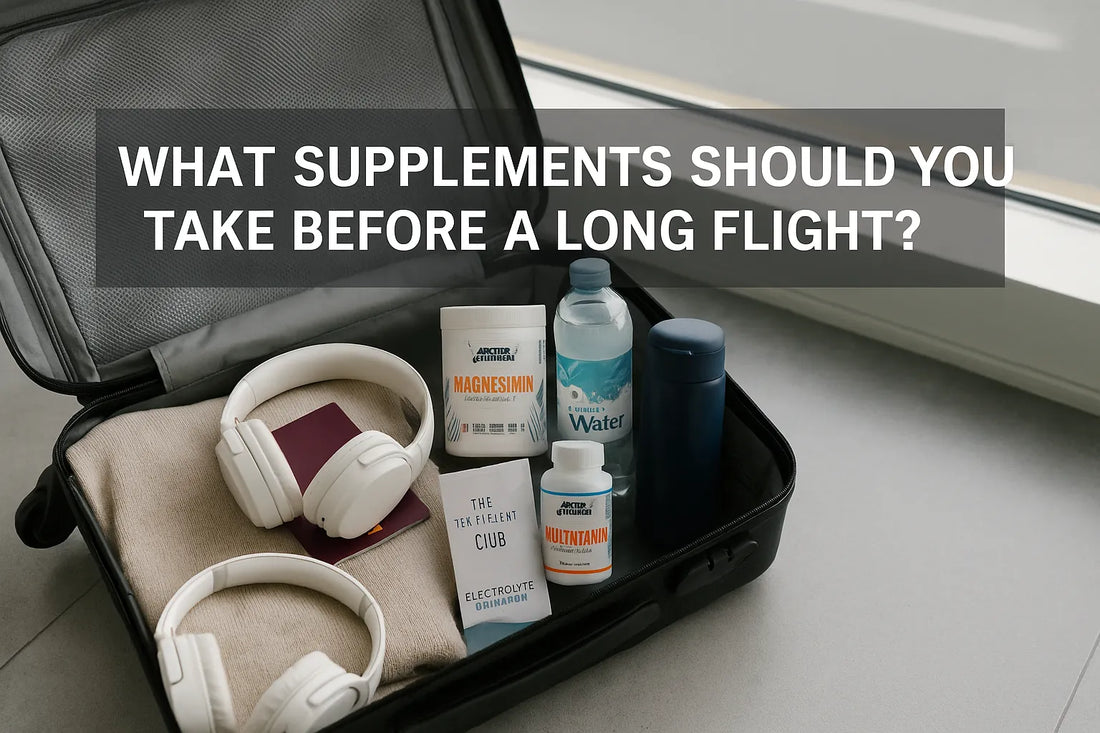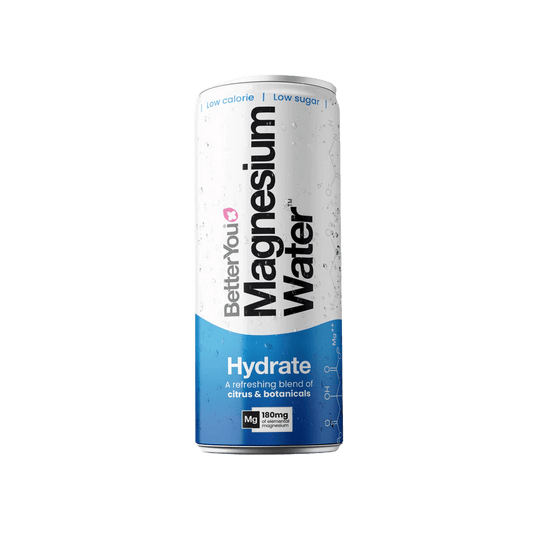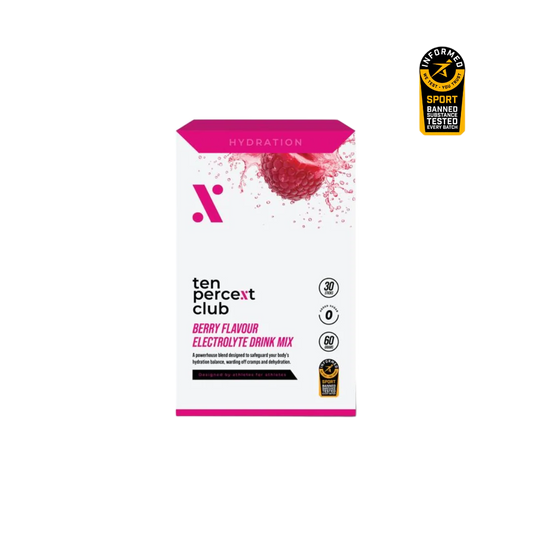A long-haul flight can feel like an endurance event. Hours of recycled air, cramped seating, dehydration, disrupted sleep, and stress—it’s no wonder most travellers step off the plane feeling exhausted, bloated, or even sick. The truth is, flying places real strain on the body, from circulation to immunity, and without preparation, you pay for it once you land.
That’s where supplements come in. While they won’t magically turn economy into first class, the right strategy can reduce flight anxiety, improve hydration, support your immune system, and help you adjust faster to a new time zone.
So, what should you take before a long flight? Let’s build a science-backed plan.
What Pills Should You Take Before a Long Flight?
The key supplements before flying aren’t exotic miracle cures—they’re the basics your body needs more of when under stress. The big three are:
-
Magnesium → calms nerves, reduces stress, and helps regulate sleep.
-
Electrolytes → prevent dehydration, headaches, and fatigue from dry cabin air.
-
Multivitamins → support immunity when you’re exposed to hundreds of passengers in close quarters.
This is your foundation stack before boarding. From there, extras like omega-3 (circulation) and sleep support can make your journey even smoother.
What Pills Calm You Down Before Flying?
Flight anxiety is incredibly common, even for regular travellers. While prescription medications exist, many people prefer a natural supplement strategy to stay calm.
-
Magnesium is one of the best options here. It helps regulate the nervous system, relax muscles, and supports the production of calming neurotransmitters like GABA.
-
For some, omega-3 also supports mood stability and reduces inflammation linked to stress.
👉 That’s why BetterYou Magnesium Water is an ideal pre-flight option. It’s simple, hydrating, and works double duty—calming nerves while helping restore minerals lost during the flight.
Is It a Good Idea to Take Aspirin or Anti-Inflammatories Before Flying?
This is a debated topic. Some people take aspirin to reduce the risk of blood clots during long flights. However, it’s not recommended for everyone, and it should only be done under medical guidance—especially if you have underlying health conditions.
For most travellers, the smarter, safer approach is to focus on:
-
Hydration (electrolytes and water)
-
Movement (getting up every couple of hours)
-
Circulation support (omega-3s naturally help maintain healthy blood flow)
Rather than reaching for aspirin unnecessarily, supplements like Supplement Needs Omega 3 are a gentler, everyday way of supporting your circulation.
Should You Take Magnesium Before Flying?
Yes—magnesium is one of the most useful supplements before a long flight. Why? Because magnesium supports:
-
Nervous system regulation → reducing stress and flight anxiety
-
Muscle relaxation → easing stiffness in cramped seats
-
Better sleep → helping you rest mid-flight or once you land
Since many travellers already run low on magnesium, flying only makes the issue worse. Cabin dehydration, stress, and disrupted sleep all deplete magnesium faster. Taking it beforehand ensures you’re not running on empty.
How Quickly Does Magnesium Reduce Flight Anxiety, and Which Type Is Best?
Magnesium doesn’t work like a sedative—it’s not going to “knock you out” in half an hour. But within 30–60 minutes, many people feel calmer and less restless.
The type matters, too:
-
Magnesium citrate → good for absorption and relaxation.
-
Magnesium glycinate → excellent for calming and sleep support.
-
Liquid magnesium water → quick and easy to sip before a flight.
👉 This is where BetterYou Magnesium Water shines—it’s convenient, hydrating, and effective, making it perfect for air travel.
When Should You Avoid Taking Magnesium Before a Flight?
For most people, magnesium is safe and beneficial. But you may want to be cautious if:
-
You already take medications for blood pressure or heart conditions.
-
You’re prone to digestive upset (higher doses of certain types, like magnesium oxide, can have a laxative effect—not ideal on a plane).
Otherwise, magnesium is one of the safest, most reliable travel supplements available.
Transition to Part 2
So far, we’ve covered the pre-flight essentials: magnesium for calmness, omega-3 for circulation, and why multivitamins and electrolytes matter even before you board.
In Part 2, we’ll go deeper into the travel supplement strategy:
-
Should you take electrolytes before a flight?
-
What vitamins protect you during air travel?
-
Does vitamin C actually prevent you from getting sick?
-
Are probiotics worth taking before a trip?
-
What really helps with jet lag (including melatonin, B12, and recovery supplements)?
-
How to build the ultimate supplement stack to step off the plane feeling fresh.
What Supplements Should You Take Before a Long Flight? (Part 2)
In Part 1, we built the foundation of your pre-flight stack: magnesium for calmness, omega-3 for circulation, and a multivitamin to cover the basics. Now it’s time to dig deeper into hydration, immunity, jet lag, and recovery so you can step off a plane feeling less like a zombie and more like yourself.
Should I Take Electrolytes Before a Flight?
Absolutely. If there’s one supplement that transforms how you feel on long flights, it’s electrolytes. Cabin air is dry—about 20% humidity compared to 40–60% on the ground—meaning you lose water faster just by breathing. Add in caffeine or alcohol, and dehydration hits even harder.
Electrolytes are key because they:
-
Prevent headaches from dehydration
-
Keep energy stable during long hours of sitting
-
Support circulation and muscle function
👉 The Ten Percent Club Electrolyte Drink Mix is ideal here. Take a serving before boarding and sip another during the flight. It’s light, convenient, and prevents the “cotton mouth + heavy legs” combo many travellers get mid-flight.
What Vitamins Should I Take Before Traveling?
Flying puts stress on your immune system. Between recycled air and close contact with passengers, exposure to bugs skyrockets. That’s why vitamins are your second line of defence.
The most useful ones are:
-
Vitamin C → antioxidant support to fight oxidative stress
-
Vitamin D → immune resilience (most people are low year-round)
-
Zinc → critical for immune response and wound healing
-
B vitamins → support energy and reduce fatigue
👉 Applied Nutrition Multivitamin makes this effortless. It covers vitamin C, D, zinc, and B vitamins in one daily serving—exactly what your body needs to handle the immune stress of flying.
Should You Take Vitamin C Before Flying?
Yes—but with perspective. Vitamin C won’t make you invincible, but studies show it can reduce the severity and duration of colds. Taking it before and during your trip gives your body the antioxidant support it needs against the oxidative stress of flying.
Instead of downing a massive orange juice (which spikes blood sugar), stick to a balanced multivitamin.
Should You Take Probiotics Before Traveling?
This one’s underrated. Travel often means different foods, unfamiliar water, and disrupted routines—all of which can upset your gut. A probiotic taken regularly before and during your trip may reduce stomach issues and support immunity (since much of your immune system lives in the gut).
If you don’t use a probiotic daily, consider bringing protein-rich, gut-friendly snacks like The Protein Ball Co Keto Balls to support your system in a more travel-friendly way.
What Are the Best Supplements for Jet Lag?
Jet lag happens because your body’s circadian rhythm (internal clock) is out of sync with local time. The main supplements that help are:
-
Melatonin → signals the body to sleep in alignment with new time zones.
-
Magnesium → relaxes muscles and supports deep rest.
-
Electrolytes → help restore hydration balance after long flights.
-
B12 → energising effect, useful in the mornings after arrival.
👉 For a practical stack, Per4m Sleep is excellent for the first night after arrival, helping reset your rhythm. Combine with electrolytes and magnesium for a smoother adjustment.
Does Melatonin Help With Jet Lag?
Yes, melatonin works—but it’s best used strategically. Taking it too early or in the wrong time zone can make jet lag worse. If you prefer a UK-available option that’s gentler and legal, supplements like Per4m Sleep (with recovery support ingredients) are a smart alternative for easing into rest without overstimulation.
Does Vitamin B12 Help With Jet Lag?
B12 won’t directly fix jet lag, but it can make mornings after a flight easier. Since B12 supports energy metabolism and nervous system function, it helps shake off the grogginess of crossing time zones. That’s another reason a multivitamin pays off—no need to carry separate bottles.
What Is the Fastest Way to Prevent Jet Lag?
Supplements are one part of the puzzle. The fastest way to beat jet lag includes:
-
Hydration → Electrolytes before, during, and after your flight.
-
Nutrients → Multivitamins and omega-3s for immune and circulation support.
-
Sleep hygiene → Magnesium or Per4m Sleep to reset your rhythm.
-
Activity → Move around mid-flight to keep circulation strong.
👉 A simple stack for travellers looks like this:
-
Before flight: The Ten Percent Club Electrolyte Drink Mix + Applied Nutrition Multivitamin
-
During flight: Extra electrolytes + BetterYou Magnesium Water
-
After flight: Per4m Sleep (first night), Omega 3 daily, another serving of electrolytes
Conclusion: The Pre-Flight Supplement Stack That Works
Flying long-haul doesn’t have to leave you wrecked. With the right supplements, you can keep your hydration balanced, support immunity, reduce stress, and even recover faster once you land.
Here’s the ultimate travel stack:
-
BetterYou Magnesium Water → pre-flight calm + nervous system support
-
Applied Nutrition Multivitamin → immunity, vitamin C, zinc, and B12
-
The Ten Percent Club Electrolyte Drink Mix → hydration hero
-
Supplement Needs Omega 3 → circulation + anti-inflammatory support
-
Per4m Sleep → jet lag recovery and deep rest after arrival
Travelling takes its toll—but if you plan like an athlete, you’ll step off the plane not just surviving, but thriving.
FAQ: Supplements Before a Long Flight
1. What’s the number one supplement to take before flying?
Electrolytes—they prevent dehydration, headaches, and fatigue.
2. Does magnesium help with flight anxiety?
Yes, magnesium calms nerves and relaxes muscles, making flying less stressful.
3. Should I take aspirin before flying?
Only under medical advice. For most people, omega-3 and hydration are safer ways to support circulation.
4. Do multivitamins help with travel?
Yes, they cover immune-support nutrients like vitamin C, D, zinc, and B12.
5. Can probiotics prevent travel sickness?
They support gut health, reducing stomach issues while abroad.
6. What’s the best supplement for jet lag?
Melatonin works, but magnesium and recovery-focused supplements like Per4m Sleep are great alternatives.
7. How soon before a flight should I take electrolytes?
About an hour before boarding, then sip throughout the flight.
8. Does vitamin C stop you getting sick on flights?
It helps reduce severity and duration of illness but isn’t a guarantee.
9. Should I keep taking supplements during the flight?
Yes—sip electrolytes and magnesium water for steady support.
10. What’s the simplest pre-flight stack?
Electrolytes, multivitamin, magnesium, omega-3, and a recovery aid like Per4m Sleep after landing.





